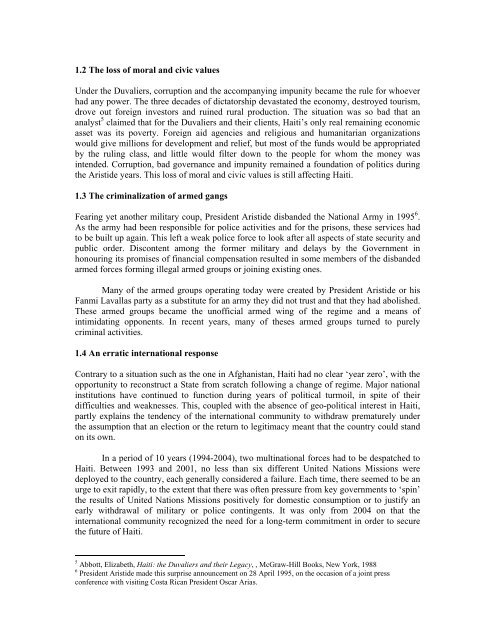case study Haiti - United Nations Development Programme
case study Haiti - United Nations Development Programme
case study Haiti - United Nations Development Programme
You also want an ePaper? Increase the reach of your titles
YUMPU automatically turns print PDFs into web optimized ePapers that Google loves.
1.2 The loss of moral and civic values<br />
Under the Duvaliers, corruption and the accompanying impunity became the rule for whoever<br />
had any power. The three decades of dictatorship devastated the economy, destroyed tourism,<br />
drove out foreign investors and ruined rural production. The situation was so bad that an<br />
analyst 5 claimed that for the Duvaliers and their clients, <strong>Haiti</strong>’s only real remaining economic<br />
asset was its poverty. Foreign aid agencies and religious and humanitarian organizations<br />
would give millions for development and relief, but most of the funds would be appropriated<br />
by the ruling class, and little would filter down to the people for whom the money was<br />
intended. Corruption, bad governance and impunity remained a foundation of politics during<br />
the Aristide years. This loss of moral and civic values is still affecting <strong>Haiti</strong>.<br />
1.3 The criminalization of armed gangs<br />
Fearing yet another military coup, President Aristide disbanded the National Army in 1995 6 .<br />
As the army had been responsible for police activities and for the prisons, these services had<br />
to be built up again. This left a weak police force to look after all aspects of state security and<br />
public order. Discontent among the former military and delays by the Government in<br />
honouring its promises of financial compensation resulted in some members of the disbanded<br />
armed forces forming illegal armed groups or joining existing ones.<br />
Many of the armed groups operating today were created by President Aristide or his<br />
Fanmi Lavallas party as a substitute for an army they did not trust and that they had abolished.<br />
These armed groups became the unofficial armed wing of the regime and a means of<br />
intimidating opponents. In recent years, many of theses armed groups turned to purely<br />
criminal activities.<br />
1.4 An erratic international response<br />
Contrary to a situation such as the one in Afghanistan, <strong>Haiti</strong> had no clear ‘year zero’, with the<br />
opportunity to reconstruct a State from scratch following a change of regime. Major national<br />
institutions have continued to function during years of political turmoil, in spite of their<br />
difficulties and weaknesses. This, coupled with the absence of geo-political interest in <strong>Haiti</strong>,<br />
partly explains the tendency of the international community to withdraw prematurely under<br />
the assumption that an election or the return to legitimacy meant that the country could stand<br />
on its own.<br />
In a period of 10 years (1994-2004), two multinational forces had to be despatched to<br />
<strong>Haiti</strong>. Between 1993 and 2001, no less than six different <strong>United</strong> <strong>Nations</strong> Missions were<br />
deployed to the country, each generally considered a failure. Each time, there seemed to be an<br />
urge to exit rapidly, to the extent that there was often pressure from key governments to ‘spin’<br />
the results of <strong>United</strong> <strong>Nations</strong> Missions positively for domestic consumption or to justify an<br />
early withdrawal of military or police contingents. It was only from 2004 on that the<br />
international community recognized the need for a long-term commitment in order to secure<br />
the future of <strong>Haiti</strong>.<br />
5 Abbott, Elizabeth, <strong>Haiti</strong>: the Duvaliers and their Legacy, , McGraw-Hill Books, New York, 1988<br />
6 President Aristide made this surprise announcement on 28 April 1995, on the occasion of a joint press<br />
conference with visiting Costa Rican President Oscar Arias.

















